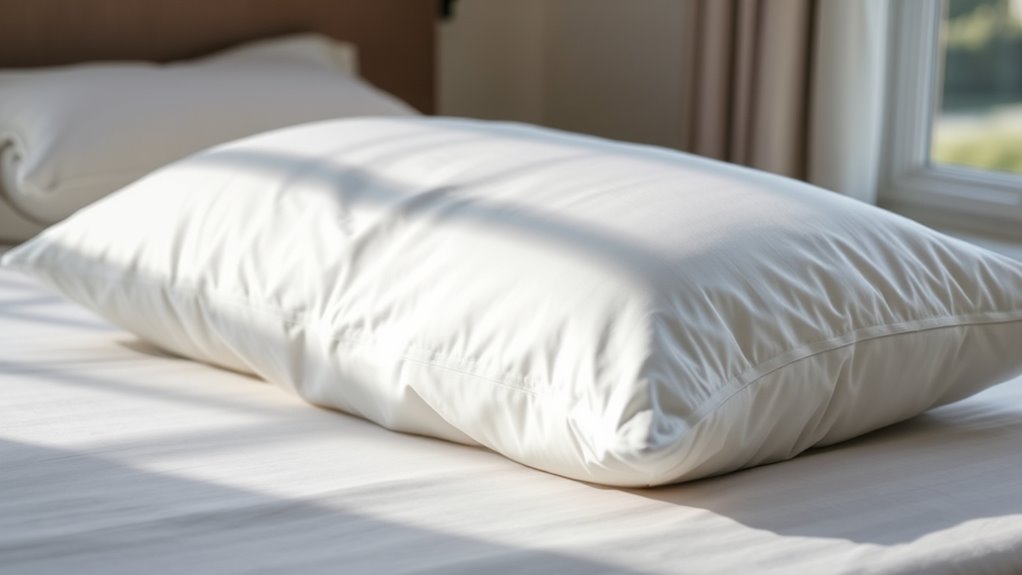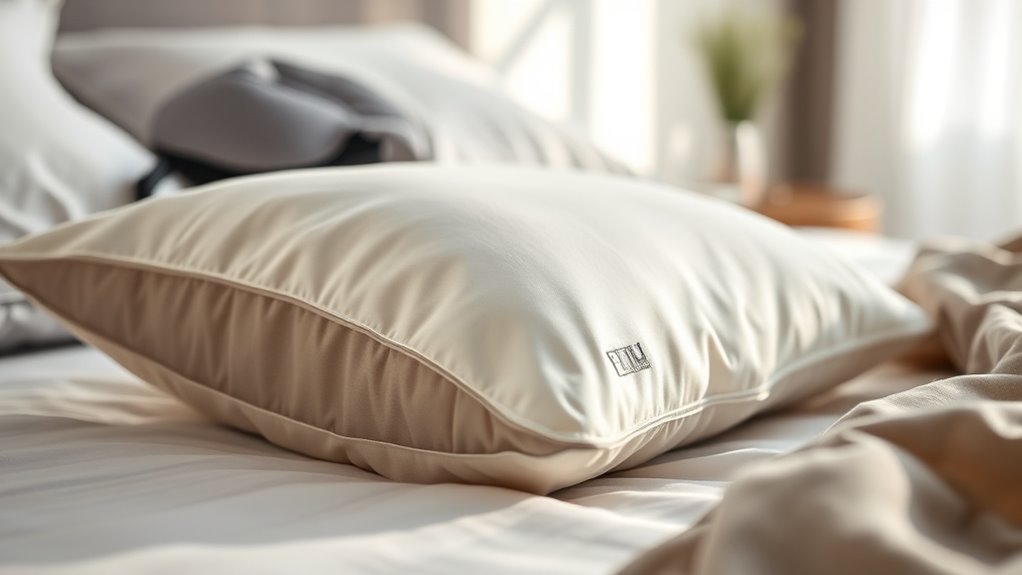Your pillow can wreck your neck if it doesn’t support proper alignment or fits your sleep position. Too high or too flat, unsupported pillows cause strain and discomfort, leading to pain over time. Choosing the right pillow—like memory foam for contouring or adjustable options—helps keep your neck in a neutral position. Understanding the materials and support options will guide you to better sleep health. Keep exploring to learn how to optimize your pillow choices for neck comfort.
Key Takeaways
- Proper pillow support maintains neural neck alignment, reducing strain and preventing neck pain caused by unsuitable pillow types or heights.
- Memory foam and natural materials offer better support and pressure relief, minimizing pressure points that can harm neck health.
- Sleeping position dictates pillow firmness and thickness; mismatched support can lead to neck misalignment and discomfort.
- Regularly replacing worn-out pillows and choosing hypoallergenic, breathable materials helps prevent neck strain and allergic reactions.
- Understanding pillow materials and support options enables better choices for long-term neck health and overall sleep quality.
Understanding the Impact of Pillows on Neck Alignment

Pillows play a crucial role in maintaining proper neck alignment during sleep, and choosing the right one can considerably impact your neck health. The pillow material affects how well it supports your neck and comfort level, with memory foam, latex, and down offering different benefits. Your sleep position also matters; side sleepers need firmer, thicker pillows to fill the space between shoulders and head, while back sleepers require medium support to keep the neck aligned. Stomach sleepers should opt for softer, thinner pillows to prevent strain. The right combination of pillow material and sleep position ensures your neck stays in a neutral, healthy position throughout the night, reducing pain and preventing long-term issues. Selecting appropriate support is essential for restful, pain-free sleep. Additionally, understanding how sleep biomechanics influence your pillow choice can help you optimize comfort and prevent neck problems over time.
Types of Pillows and Their Effects on Spinal Health

Different pillow types can considerably impact your spinal health. Memory foam offers contouring support, while down and feather pillows provide softness, and adjustable pillows let you customize your comfort. Understanding these options helps you choose the best pillow for maintaining proper neck alignment. Using the right pillow can also help prevent overhydration issues, which may cause discomfort or disrupt sleep.
Memory Foam Benefits
Because memory foam molds to your body’s shape, it provides exceptional support that can help maintain proper spinal alignment during sleep. This material distributes your body weight evenly, offering pressure relief where you need it most. By contouring to your neck and head, memory foam reduces pressure points that can cause discomfort and misalignment. This targeted support can help prevent neck pain and stiffness caused by inadequate pillow support. Additionally, memory foam’s ability to absorb movement minimizes tossing and turning, promoting more restful sleep. Its adaptive qualities ensure your head and neck stay in a neutral position throughout the night. Moreover, the contrast ratio of memory foam enhances its ability to respond quickly to your movements, providing consistent support. Overall, memory foam pillows enhance spinal health by offering customized support, pressure relief, and stability, making them a smart choice for those seeking to protect their necks during sleep.
Down and Feather Support
While down and feather pillows offer a plush, luxurious feel, their support level can vary considerably, impacting your spinal alignment during sleep. The pillow firmness depends largely on feather density, which determines how much support you get. If you choose a pillow with low feather density, it may feel soft but won’t provide enough neck support, risking misalignment. Conversely, higher feather density offers more support but can feel firm and less moldable.
Consider these points:
- You might wake up with neck pain if the pillow lacks proper support.
- Feather pillows can compress over time, reducing support.
- The right feather density balances softness and support for your needs.
- Poor pillow firmness can lead to restless sleep and discomfort.
Adjustable Pillow Advantages
Adjustable pillows offer a versatile solution for maintaining proper spinal alignment during sleep. With pillow customization, you can easily modify the height and firmness to suit your unique sleep posture. This flexibility helps ensure your neck and spine stay aligned, reducing strain and discomfort. Unlike standard pillows, adjustable options allow you to fine-tune support throughout the night, which is especially beneficial if your sleep position varies. By customizing your pillow, you can better accommodate your specific needs, promoting healthier sleep and minimizing the risk of neck pain. Additionally, fiber content in some adjustable pillows can enhance comfort and support for different sleep styles. Whether you sleep on your back, side, or stomach, adjustable pillows make it easier to find the ideal support, leading to improved spinal health and a more restful night’s sleep.
How to Choose a Pillow That Supports Proper Posture

Choosing a pillow that supports proper posture starts with understanding how its size and firmness affect your neck and spine alignment. Your pillow size should match your sleeping position to keep your head aligned with your spine. For example, side sleepers need a firmer, thicker pillow, while stomach sleepers benefit from a softer, thinner one. Here are four tips to help you choose the right pillow:
- Pick a pillow size that supports your sleeping position and keeps your neck neutral.
- Opt for firmness that maintains alignment without causing pressure points.
- Consider your body’s natural curves—your pillow should fill gaps without overextending.
- Test different options to find what feels supportive yet comfortable.
- Select a pillow with appropriate materials to enhance comfort and support during sleep.
Common Pillow Mistakes That Contribute to Neck Pain

Many common pillow mistakes can lead to neck pain by misaligning your spine or putting unnecessary strain on your muscles. Poor pillow ergonomics often result from choosing a pillow that’s too high, too flat, or doesn’t support your natural sleep posture. For example, sleeping on a pillow that doesn’t match your sleep position can cause your neck to twist or bend unnaturally. Using a pillow that’s too soft or too firm can also disrupt proper alignment, leading to tension and discomfort. Additionally, neglecting pillow quality or failing to replace worn-out pillows can compromise support. These mistakes interfere with maintaining a healthy sleep posture, increasing the risk of neck pain. To avoid this, prioritize pillows that support proper ergonomics and adapt to your sleep style. Incorporating proper pillow selection can significantly improve sleep quality and reduce discomfort.
Tips for Maintaining and Replacing Your Pillow for Optimal Support

To maintain proper neck support, it’s important to regularly care for and replace your pillow as needed. Good pillow hygiene keeps allergens and bacteria away, ensuring a healthier sleep environment. Pay attention to your sleep position—if you notice stiffness or discomfort, it might be time for a replacement. Here are some tips:
- Replace your pillow every 1-2 years to prevent loss of support and hygiene buildup.
- Wash pillowcases weekly to keep your pillow fresh and clean.
- Inspect your pillow regularly for lumps or flattening that could harm your sleep position.
- Use a supportive pillow suited to your sleep style to avoid neck strain and maintain proper alignment.
- Regularly monitor your sleep environment to ensure your pillow continues to support your neck effectively.
Taking these steps helps preserve your pillow’s support and keeps your neck healthy night after night.
The Role of Pillow Materials in Comfort and Health

The materials your pillow is made from directly influence both your comfort and overall health. During pillow manufacturing, choices like memory foam, latex, or polyester fill impact how supportive and breathable your pillow feels. Natural materials like latex or cotton often promote better airflow, reducing heat buildup and moisture. However, material allergies can pose risks; some people react to latex or synthetic fabrics, leading to skin irritation or respiratory issues. Selecting hypoallergenic options can help prevent these problems. The right pillow material supports proper neck alignment, minimizes pressure points, and enhances sleep quality. Being aware of your sensitivities and understanding how different materials are manufactured allows you to choose a pillow that not only feels comfortable but also protects your health in the long run. Additionally, understanding the benefits of wood-burning stoves can inspire sustainable choices in home heating, contributing to both comfort and environmental responsibility.
Frequently Asked Questions
Can a Pillow’s Firmness Affect Sleep Quality?
Yes, a pillow’s firmness can influence your sleep quality. If your pillow is too firm or too soft, it may misalign your neck and spine, disrupting sleep and causing discomfort. The pillow material, like memory foam or feather, influences firmness and support, which should match your sleep posture. Choosing the right firmness based on your preferred sleep position helps ensure better rest and reduces neck pain.
How Often Should I Replace My Pillow for Best Support?
Like a vintage vinyl, your pillow’s lifespan wears thin over time. To keep your neck supported and sleep quality high, substitute your pillow every 1 to 2 years. The replacement frequency ensures you avoid lumps, allergens, and loss of support. Regularly checking for signs of wear helps you determine when it’s time for a fresh pillow, maintaining comfort and proper alignment through every restful night.
Are Memory Foam Pillows Better for Neck Health Than Down?
Memory foam pillows often offer better support for your neck compared to down, especially if your sleep posture involves side or back sleeping. The firm, contouring material molds to your neck’s shape, helping maintain proper alignment. Down pillows, while soft and plush, may lack consistent support and cause neck strain. Choosing a pillow with the right materials guarantees your sleep posture stays aligned and your neck remains healthy throughout the night.
What Signs Indicate My Pillow Is Causing Neck Pain?
You might notice neck pain or stiffness after sleeping, which could be a sign your pillow is causing issues. Look for pillow deformation—if it no longer retains its shape, it may not support your neck properly. Persistent neck stiffness or discomfort in the morning suggests your pillow isn’t providing adequate alignment. Switching to a supportive pillow tailored to your sleep position could help reduce these symptoms and improve your sleep quality.
Do Ergonomic Pillows Really Improve Spinal Alignment?
Think of your pillow as the bridge between comfort and alignment. Ergonomic pillows are designed with your unique shape in mind, actively supporting your head and neck. Their ergonomic design helps keep your spine in proper alignment, reducing strain and pain. When you choose one, you’re investing in a tool that promotes better spinal alignment, making it easier to wake up refreshed and pain-free.
Conclusion
Choosing the right pillow can make all the difference in preventing neck pain and ensuring restful sleep. By understanding your needs and avoiding common mistakes, you’ll support your spine like a true knight of the sleep domain. Remember to replace your pillow when it’s past its prime—your neck will thank you, and you’ll wake up feeling refreshed. Don’t be a knave in the game of comfort; prioritize your pillow, and sleep like a king or queen every night.









